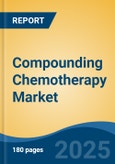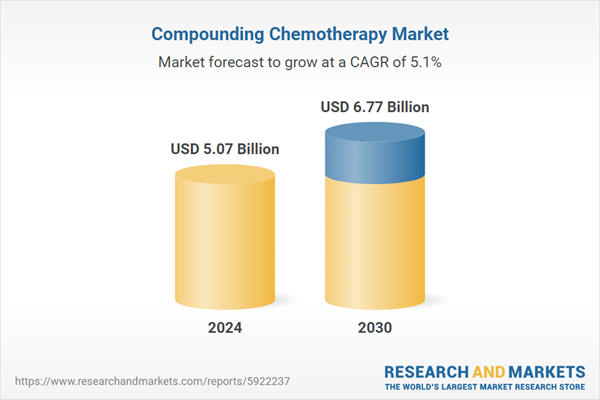Speak directly to the analyst to clarify any post sales queries you may have.
10% Free customizationThis report comes with 10% free customization, enabling you to add data that meets your specific business needs.
Compounded chemotherapy medications can be prepared in various dosage forms, such as oral solutions, capsules, topical creams, suppositories, and intravenous (IV) formulations. The choice of dosage form depends on the patient's medical needs, preferences, and the specific requirements of the treatment plan. Compounding chemotherapy is particularly valuable for pediatric and geriatric patients who may have unique dosing requirements or difficulty swallowing conventional pills or capsules. Compounded formulations can be designed to meet the specific needs of these populations.
Key Market Drivers
Advancements in Drug Development
Targeted therapies have revolutionized cancer treatment by specifically targeting molecules or pathways involved in cancer growth. These therapies are designed to be more selective in attacking cancer cells while sparing healthy ones. Compounded chemotherapy drugs now include a range of targeted agents tailored to individual patient profiles. Immunotherapy drugs, such as immune checkpoint inhibitors, have emerged as a promising approach to cancer treatment. These drugs harness the patient's immune system to recognize and attack cancer cells. Compounding pharmacies prepare these immunotherapies for administration, contributing to their widespread use.The development and approval of biosimilar versions of some chemotherapy agents have increased access to these treatments while reducing costs. Compounding pharmacies may be involved in preparing and supplying biosimilars, ensuring their availability. Nanoparticle-based chemotherapy formulations have been developed to improve drug delivery and enhance the therapeutic index of chemotherapy agents. These nanocarriers can target cancer cells more precisely and reduce side effects. Compounding pharmacies are involved in preparing these advanced formulations.
Liposomal encapsulation is a drug delivery technique that involves enclosing chemotherapy drugs in liposomes (tiny fat bubbles). This approach improves drug solubility, extends drug circulation in the body, and enhances drug delivery to tumor sites. Compounded liposomal chemotherapy formulations are increasingly used. Ongoing research efforts continue to identify new chemotherapy agents, combination therapies, and treatment regimens. Compounding pharmacies play a pivotal role in preparing and supplying these innovative drugs for clinical use and research purposes.
Key Market Challenges
Quality Control and Safety
Compounded medications, including chemotherapy drugs, must adhere to strict regulatory guidelines and standards set by government agencies like the U.S. Food and Drug Administration (FDA) in the United States. Compliance with these regulations is critical to ensure the safety and efficacy of compounded drugs. Maintaining consistent quality in compounded chemotherapy drugs is challenging due to variations in raw materials, compounding processes, and equipment. Quality control measures must be in place to ensure that each batch of compounded medication meets established standards. Chemotherapy drugs are typically administered intravenously, which necessitates strict sterility measures during compounding.Contamination can lead to severe infections and adverse patient outcomes. Maintaining sterility is a constant concern. Cross-contamination is a risk when multiple chemotherapy drugs are compounded in the same facility. Stringent cleaning and sanitation procedures are essential to prevent unintended mixing of drugs and contamination. Precise dosing is critical in chemotherapy to achieve the desired therapeutic effect while minimizing side effects. Variability in dosing can lead to treatment failures or toxicity. Ensuring the accuracy of compounded doses is challenging but essential. Some chemotherapy drugs are chemically unstable and can degrade over time. Compounding pharmacies must monitor and manage drug stability to ensure that patients receive medications with the intended potency and efficacy.
Key Market Trends
Rising Interest in Sterile Compounding
Sterile compounding is essential for chemotherapy drugs, which are often administered intravenously or directly into the bloodstream. Ensuring sterility prevents the risk of infections and other complications, which can be life-threatening for cancer patients with compromised immune systems. Many chemotherapy drugs are potent and require precise dosing and administration. Sterile compounding allows for the accurate preparation of these drugs to minimize the risk of dosage errors. Sterile compounding facilitates the customization of chemotherapy regimens based on individual patient profiles, including cancer type, stage, and medical history. This personalized approach aligns with the trend toward precision medicine.The development of advanced drug delivery methods, such as nanoparticle-based formulations and liposomal encapsulation, has increased the demand for sterile compounding. These delivery systems require aseptic preparation. The focus on patient-centered care in oncology emphasizes providing treatments that are safe, effective, and tailored to individual patient needs. Sterile compounding supports this approach by ensuring the highest standards of safety and quality.
Key Market Players
- Pfizer Inc.
- Baxter International Inc.
- Grifols SA
- Comecer S.P.A.
- Arxium Inc.
- Dedalus Group
- B. Braun Melsungen AG
- Omnicell Technologies Inc.
- The Metrix Company
- Sterline S.R.L
Report Scope:
In this report, the Global Compounding Chemotherapy Market has been segmented into the following categories, in addition to the industry trends which have also been detailed below:Compounding Chemotherapy Market, By Drug Type:
- Cytotoxic Drugs
- Hormonal Agents
- Immunomodulatory Agents
- Targeted Therapies
- Supportive Care Drugs
Compounding Chemotherapy Market, By Route of Administration:
- Intravenous
- Oral
- Subcutaneous
- Intramuscular
- Intrathecal
Compounding Chemotherapy Market, By Cancer Type:
- Breast Cancer
- Lung Cancer
- Colorectal Cancer
- Prostate Cancer
- Leukemia
- Lymphoma
Compounding Chemotherapy Market, By Distribution Channel:
- Hospital Pharmacies
- Retail Pharmacies
- Online Pharmacies
Compounding Chemotherapy Market, By region:
- North America
- United States
- Canada
- Mexico
- Asia-Pacific
- China
- India
- South Korea
- Australia
- Japan
- Europe
- Germany
- France
- United Kingdom
- Spain
- Italy
- South America
- Brazil
- Argentina
- Colombia
- Middle East & Africa
- South Africa
- Saudi Arabia
- UAE
Competitive Landscape
Company Profiles: Detailed analysis of the major companies present in the Global Compounding Chemotherapy Market.Available Customizations:
With the given market data, the publisher offers customizations according to a company's specific needs. The following customization options are available for the report.Company Information
- Detailed analysis and profiling of additional market players (up to five).
This product will be delivered within 1-3 business days.
Table of Contents
Companies Mentioned
- Pfizer Inc.
- Baxter International Inc.
- Grifols SA
- Comecer S.P.A.
- Arxium Inc.
- Dedalus Group
- B. Braun Melsungen AG
- Omnicell Technologies Inc.
- The Metrix Company
- Sterline S.R.L
Table Information
| Report Attribute | Details |
|---|---|
| No. of Pages | 180 |
| Published | March 2025 |
| Forecast Period | 2024 - 2030 |
| Estimated Market Value ( USD | $ 5.07 Billion |
| Forecasted Market Value ( USD | $ 6.77 Billion |
| Compound Annual Growth Rate | 5.0% |
| Regions Covered | Global |
| No. of Companies Mentioned | 10 |









